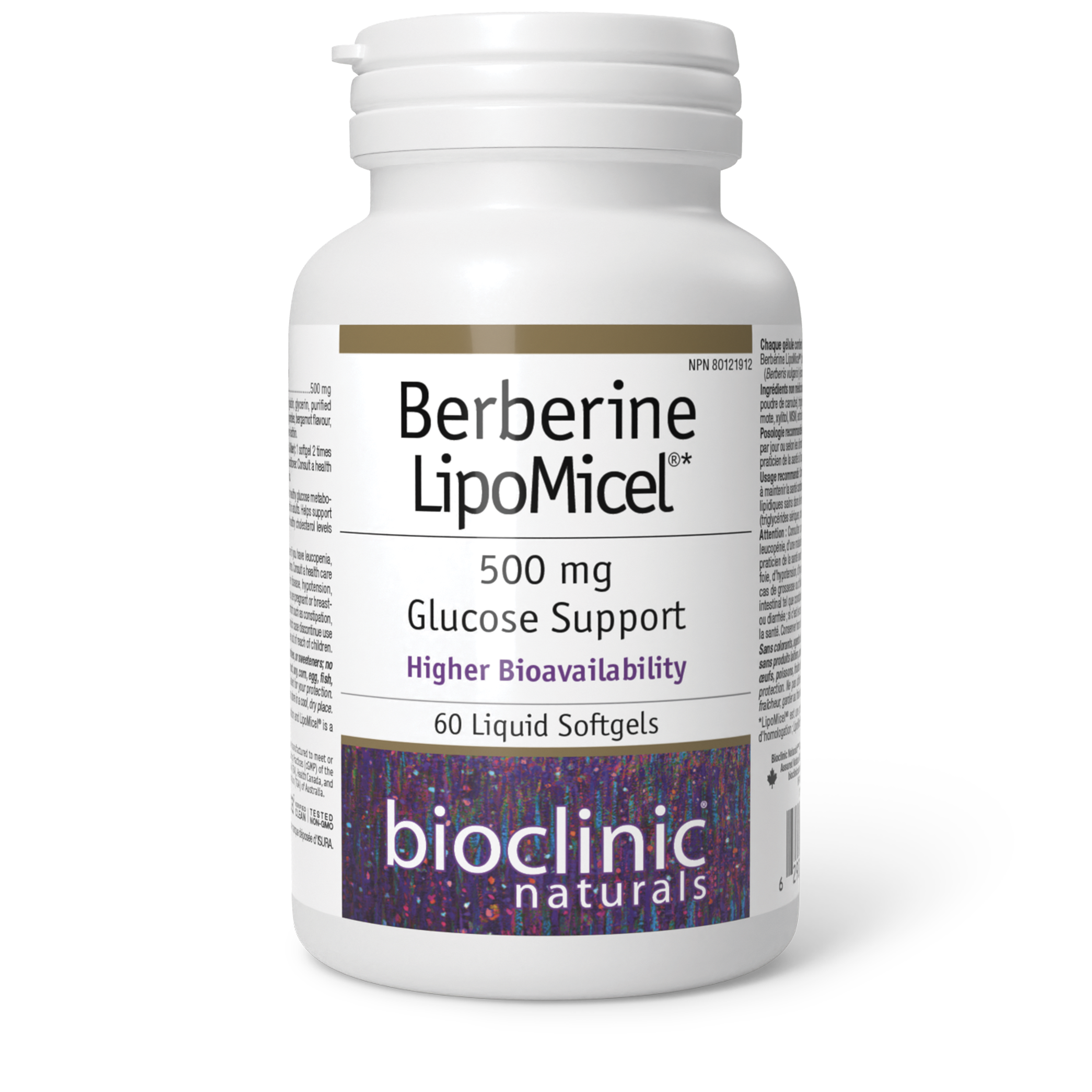
Higher Bioavailability
500 mg
60 Liquid Softgels ( SKU: 9214, NPN: 80121912 )
Benefits
- Provides 500 mg of berberine HCl per softgel, the dosing strength used in clinical trials for glucose and lipid control
- Uses LipoMicel technology, which creates a liquid micelle matrix that disperses the berberine into tiny microdroplets, resulting in a highly stable delivery system for higher absorption than standard forms
- Supports healthy glucose metabolism via multiple mechanisms, including enhancement of insulin sensitivity
- Has favourable effects on blood lipids, including a reduction in triglycerides and both total and LDL cholesterol
- Activates Nrf-2, a key regulator of antioxidant gene transcription and prevention of glucose-induced neurotoxicity
- Helps maintain cardiovascular health
- Extracted from Berberis vulgaris (European barberry
Feature Summary
While berberine is traditionally used for gastrointestinal symptoms, current research shows that it also has benefits for blood glucose support, cardiovascular health, and antioxidant activity.1–7 It helps lower blood glucose by slowing the absorption of carbohydrates and supporting insulin sensitivity, in addition to lowering HbA1c levels.1,2 It helps reduce waist circumference and body weight, blood pressure, and triglycerides in metabolic syndrome.4,5 It also helps lower blood pressure, total and LDL cholesterol, and triglyceride levels.4–8
Berberine improves insulin sensitivity through inhibition of alpha-glucosidase activity, upregulation of insulin receptors in peripheral tissues,1,2 AMPK activation, and UHRF1 inhibition.9 In controlled trials, it reduced HbA1c levels with comparable efficacy to standard treatment. Berberine also activates Nrf2, a key regulator of cellular antioxidant defence, and attenuates glucose-induced neurotoxicity.3
Berberine supplements can vary widely in bioavailability. Improved delivery forms, such as LipoMicel berberine, enhance bioavailability, provide resistance against intestinal degradation, and may also improve intracellular delivery.10 A pilot crossover study showed that LipoMicel berberine was effective in lowering blood glucose levels by 12% after two 500 mg doses.11
Medicinal Ingredients
| Each Softgel Contains: | |
| Berberine LipoMicel®* (hydrochloride) (Berberis vulgaris) (root bark) | 500 mg |
Non-Medicinal Ingredients
Softgel (gelatin, glycerin, purified water, carob powder), medium chain triglycerides, bergamot flavour, xylitol, MSM, stevia leaf extract, sunflower lecithin.
Dosage:
Recommended Adult Dose (18 Years & Older): 1 softgel 2 times per day or as directed by a health care practitioner. Consult a health care practitioner for use beyond 3 months.
Warnings:
Consult a health care practitioner if you have leucopenia, a kidney disorder, or blood pressure problems. Consult a health care practitioner prior to use if you have liver disease, hypotension, hypoglycemia, or diabetes. Do not use if you are pregnant or breastfeeding. May cause gastrointestinal discomfort such as constipation, vomiting, abdominal pain, or diarrhea, in which case discontinue use and consult a health care practitioner. Keep out of reach of children.
Allergens:
Contains no artificial colours, preservatives, or sweeteners; no dairy, starch, sugar, wheat, gluten, yeast, soy, corn, egg, fish, shellfish, salt, tree nuts, or GMOs.
Contraindications
Do not use if you are pregnant or breastfeeding.
Drug Interactions
Berberine has been shown to lower blood glucose levels and may have an additive effect when combined with other hypoglycemic medications, such as metformin. Berberine has been shown to increase levels of cyclosporin A, and combined use should be avoided.12 Berberine has demonstrated inhibitory activity on cytochrome enzymes CYP2D6, 3A4, and CYP2C9, and the use of medications metabolized by these enzymes should be monitored.13
- Zhang, H., Wei, J., Xue, R., et al. (2010). Berberine lowers blood glucose in type 2 diabetes mellitus patients through increasing insulin receptor expression. Metabolism, 59(2), 285-92.
- Li, Z.Q., Zuo, D.Y., Qie, X.D., et al. (2012). Berberine acutely inhibits the digestion of maltose in the intestine. J Ethnopharmacol, 142(2), 474-80.
- Hsu, Y.Y., Tseng, Y.T., & Lo, Y.C. (2013). Berberine, a natural antidiabetes drug, attenuates glucose neurotoxicity and promotes Nrf2-related neurite outgrowth. Toxicol Appl Pharmacol, 272(3), 787-96.
- Pérez-Rubio, K.G., González-Ortiz, M., Martinez-Abundis, E., et al. (2013). Effect of berberine administration on metabolic syndrome, insulin sensitivity, and insulin secretion. Metab Syndr Relat Disord, 11(5), 366-9.
- Wei, W., Zhao, H., Wang, A., et al. (2012). A clinical study on the short-term effect of berberine in comparison to metformin on the metabolic characteristics of women with polycystic ovary syndrome. Eur J Endocrinol, 166(1), 99-105.
- Yin, J., Xing, H., & Ye, J. (2008). Efficacy of berberine in patients with type 2 diabetes mellitus. Metabolism, 57(5), 712-
- Zhang, Y., Li, X., Zou, D., et al. (2008). Treatment of type 2 diabetes and dyslipidemia with the natural plant alkaloid berberine. J Clin Endocrinol Metab, 93(7), 2559-65.
- Dong, H., Zhao, Y., Zhao, L., et al. (2013). The effects of berberine on blood lipids: A systemic review and meta-analysis of randomized controlled trials. Planta Med, 79(6), 437-46.
- Ren, G., Ding, Y.W., Wang, L.L., et al. (2023). Berberine stimulates lysosomal AMPK independent of PEN2 and maintains cellular AMPK activity through inhibiting the dephosphorylation regulator UHRF1. Front Pharmacol, 14, 1148611.
- Solnier, J., Chang, C, Roh, K., et al. (2021). Quercetin LipoMicel—A novel delivery system to enhance bioavailability of quercetin. J Nat Health Prod Res, 3(2), 1-8.
- Chang, C., Roh, K., Du, M., et al. (2023). A pilot crossover study of berberine and its short-term effects on blood glucose levels in healthy volunteers. J Nat Health Prod Res, 5(2), 1-11.
- Xin, H.W., Wu, X.C., Li, Q., et al. (2006). The effects of berberine on the pharmacokinetics of cyclosporin A in healthy volunteers. Methods Find Exp Clin Pharmacol, 28(1), 25-9.
- Guo, Y., Chen, Y., Tan, Z.R., et al. (2012). Repeated administration of berberine inhibits cytochromes P450 in humans. Eur J Clin Pharmacol, 68(2), 213-7.
